Unit 2 Ways to go to school 单元复习课件(语音+词汇+句型+语法+练习)(共34张PPT)
文档属性
| 名称 | Unit 2 Ways to go to school 单元复习课件(语音+词汇+句型+语法+练习)(共34张PPT) |  | |
| 格式 | pptx | ||
| 文件大小 | 6.1MB | ||
| 资源类型 | 试卷 | ||
| 版本资源 | 人教版(PEP) | ||
| 科目 | 英语 | ||
| 更新时间 | 2024-09-25 10:30:16 | ||
图片预览



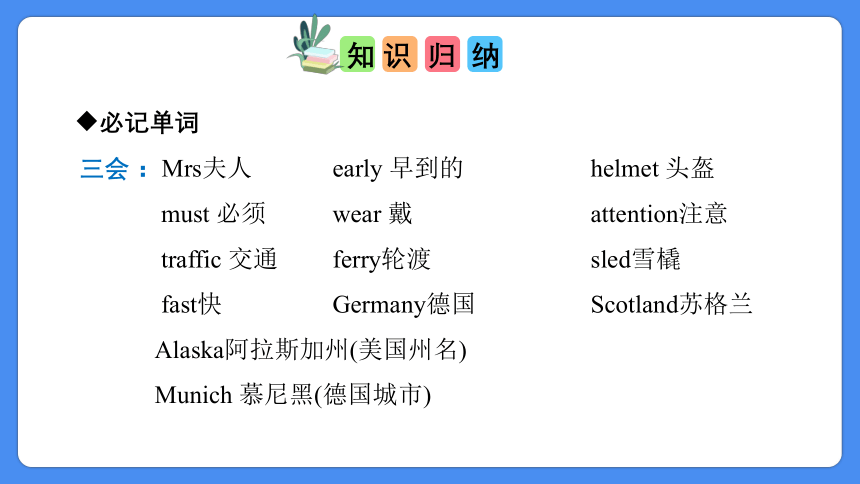
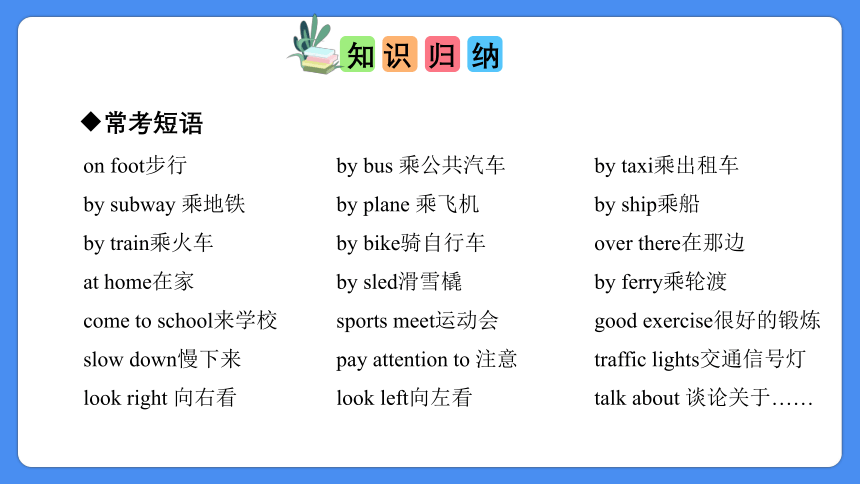

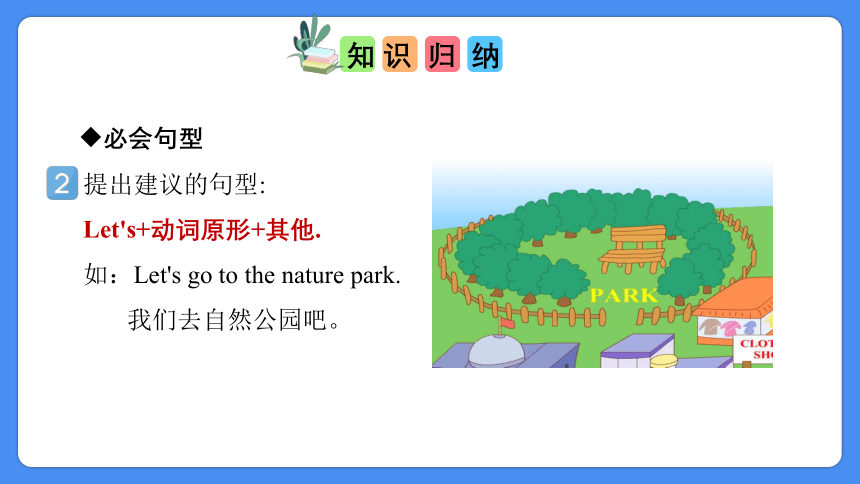


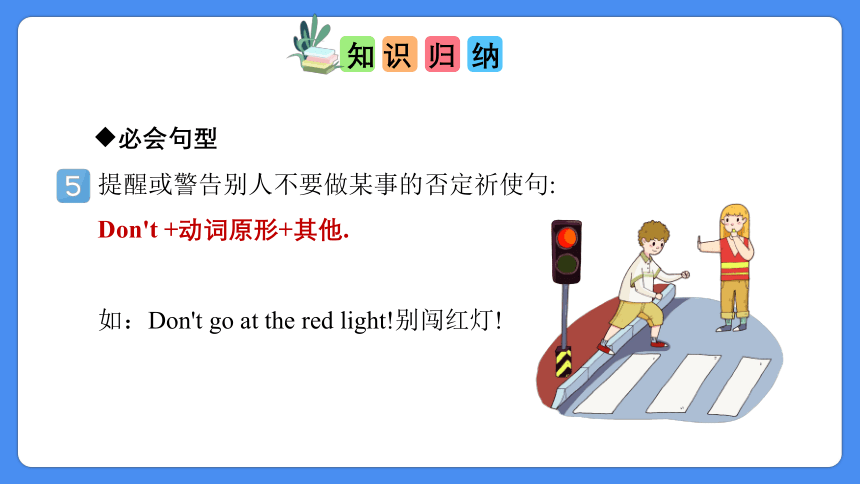
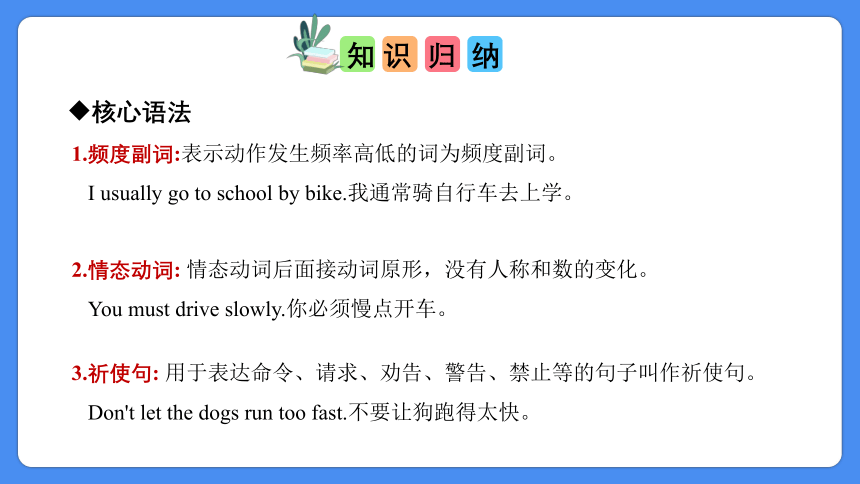
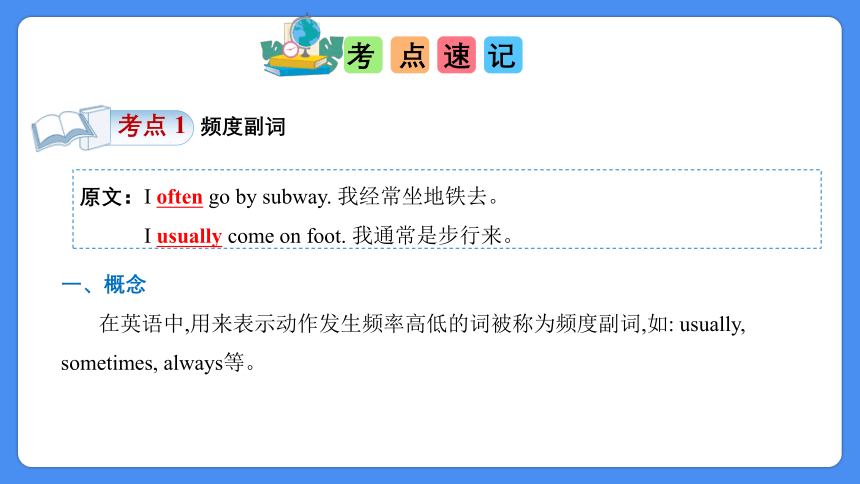
文档简介
(共34张PPT)
Unit 2 Ways to go to school授课人:人教PEP版英语六年级上册复习
知 识 归 纳
连读
语句子中单词之间有连读现象,如:
知 识 归 纳
必记单词
四会 :by(表示方式)乘 bus公共汽车 plane 飞机
train 火车 taxi出租汽车 ship(大)船
subway 地铁 stop 停下 down减少;降低
slow(使)放慢速度;慢的
知 识 归 纳
必记单词
三会 :Mrs夫人 early 早到的 helmet 头盔
must 必须 wear 戴 attention注意
traffic 交通 ferry轮渡 sled雪橇
fast快 Germany德国 Scotland苏格兰
Alaska阿拉斯加州(美国州名)
Munich 慕尼黑(德国城市)
知 识 归 纳
常考短语
on foot步行 by bus 乘公共汽车 by taxi乘出租车
by subway 乘地铁 by plane 乘飞机 by ship乘船
by train乘火车 by bike骑自行车 over there在那边
at home在家 by sled滑雪橇 by ferry乘轮渡
come to school来学校 sports meet运动会 good exercise很好的锻炼
slow down慢下来 pay attention to 注意 traffic lights交通信号灯
look right 向右看 look left向左看 talk about 谈论关于……
知 识 归 纳
必会句型
询问对方来某地的交通方式的句型:
How do you come to+地点
How do you come to school
你怎么来学校的
知 识 归 纳
必会句型
提出建议的句型:
Let's+动词原形+其他.
如:Let's go to the nature park.
我们去自然公园吧。
知 识 归 纳
必会句型
表达某人必须做某事的句型:
主语+ must+动词原形+其他.
如:I must pay attention to the traffic lights!我必须注意交通信号灯!
知 识 归 纳
必会句型
提醒或命令别人做某事的肯定祈使句:
动词原形+其他.
如:Stop and wait at a red light!
停下来等红灯。
知 识 归 纳
必会句型
提醒或警告别人不要做某事的否定祈使句:
Don't +动词原形+其他.
如:Don't go at the red light!别闯红灯!
知 识 归 纳
核心语法
1.频度副词:表示动作发生频率高低的词为频度副词。
I usually go to school by bike.我通常骑自行车去上学。
2.情态动词: 情态动词后面接动词原形,没有人称和数的变化。
You must drive slowly.你必须慢点开车。
3.祈使句: 用于表达命令、请求、劝告、警告、禁止等的句子叫作祈使句。
Don't let the dogs run too fast.不要让狗跑得太快。
考 点 速 记
频度副词
考点 1
原文:I often go by subway. 我经常坐地铁去。
I usually come on foot. 我通常是步行来。
一、概念
在英语中,用来表示动作发生频率高低的词被称为频度副词,如: usually, sometimes, always等。
考 点 速 记
二、在陈述句中的位置
频度副词在陈述句中一般位于 be动词和助动词之后,行为动词之前,也可位于句首或句末。如:
I often go to school on foot.我经常步行去上学。
My father is usually at home at the weekend.我的爸爸通常周末在家。
Sometimes I watch a film on Saturday.有时,我周六看电影。
考 点 速 记
三、常见的频度副词的用法比较
考 点 速 记
三、常见的频度副词的用法比较
一、根据条形统计图,用 usually,sometimes,often填空。
提 分 练
1. Diandian ________ comes to school by bus.
2. Diandian ________ comes to school by bike.
3. Diandian ________ comes to school by subway.
often
usually
sometimes
二、根据图表回答问题。
提 分 练
1. Who usually goes to work by bus
________________________________________________________
2. How does Tom always go to work
________________________________________________________
3. How does Mike often go to work
________________________________________________________
4. Does Amy often go to work by car
________________________________________________________
Amy.
By bike.
On foot.
No, she doesn’t.
考 点 速 记
情态动词
考点 2
原文:Mr Jones, how can I get to the Fuxing Hospital 琼斯先生,我怎么才能到达复兴医院?
I must pay attention to the traffic lights! 我必须注意交通灯!
一、情态动词的定义
情态动词表示说话人的情绪和态度,不能单独作谓语,只能与行为动词或系动词连用构成谓语。
小学阶段所学的情态动词有:can、may、must、should、would、could、need等,它们的否定形式就是在其后加 not。
考 点 速 记
cannot= can't must not= mustn't
should not= shouldn't need not= needn't
would not= wouldn't could not= couldn't
二、情态动词的位置
在陈述句中,情态动词位于动词之前。在疑问句中,情态动词位于主语之前。
三、情态动词的语法特征
1.情态动词后面接动词原形。
2.情态动词没有人称和数的变化。
注意:have to属于情态动词短语,它在句中的变化形式与行为动词have相同。
一、单项选择。
( ) 1." You ________ kill the Snow White," said the queen.
A. must B. could C. can
( ) 2. Can you ________ me the way to the library
A. to tell B. telling C. tell
( ) 3. You must ________a life jacket.
A. wear B. wears C. wearing
( ) 4.—________ I help you
—Yes, please.
A. Would B. May C. Will
提 分 练
A
C
A
B
一、单项选择。
( ) 5. You ________ play on the road.
A. can't B. must C. need
( ) 6. ________ you like to go with me
A. Must B. Can C. Would
( ) 7.—________ I go to the park now
—No, you ________ stay here.
A. May; must B. Must; shall C. Will; can
提 分 练
A
C
A
二、根据要求完成句子。
(一) 对画线部分提问。
1. I would like some ice cream to eat.
________________________________________________________
2. She could play football five years ago.
________________________________________________________
提 分 练
What would you like to eat
When could she play football
二、根据要求完成句子。
(二) 改为一般疑问句,并作肯定和否定回答。
1. They can play the piano well.
________________________________________________________
________________________________________________________
2. You must go home now.
________________________________________________________
________________________________________________________
提 分 练
—Can they play the piano well
—Yes, they can. / No, they can't.
—Must I go home now
—Yes, you must./ No, you needn't.
二、根据要求完成句子。
(三) 改为否定句。
1. She should go to school early.
________________________________________________________
2. I have to buy a new sweater.
________________________________________________________
提 分 练
She shouldn't go to school early.
I don't have to buy a new sweater.
考 点 速 记
祈使句
考点 3
原文:Don’t go at the red light! 不要去闯红灯!
Take the No.57 bus over there. 乘No. 57巴士去那里。
一、概念
用于表达命令、请求、劝告、警告、禁止等的句子叫作祈使句,祈使句常用于表达命令。
二、句型结构
祈使句的主语通常是第二人称,所以一般省略主语。祈使句有两种结构。
考 点 速 记
1.肯定结构
(1) Do型:动词原形+其他.
(2) Be型:Be+表语(名词短语或形容词)+其他.
(3) Let型: Let+宾语+动词原形+其他.
2.否定结构
(1) Do 型和 Be型的否定形式是在句首加 Don't。
(2) Let型的否定形式有两种:“ Don't let +宾语+动词原形+其他.”和“ Let+宾语+ not+动词原形+其他.”
(3)有些以 No开头,用来引导表示禁止的祈使句。
考 点 速 记
口诀:
祈使句无主语,主语 you常省去;
动词原形当谓语,句首加 Don't变否定;
朗读应当用降调,句末句点感叹号。
一、用所给词的适当形式填空。
1. ________( not talk) to your mum like that!
2.—Let ________(I) help you! —Thank you.
3.—________( go) this way, please. —OK.
4. ________( be) quiet, please.
5. Let's ________( say) something about it.
提 分 练
Don’t talk
me
Go
Be
say
一、用所给词的适当形式填空。
6. Let ________( they) go to the shop.
7. Let her ________( not eat) the ice cream.
8. ________( not be) late for school again.
9. ________( not swim) in the river.
10. Tell him ________( not come) to the classroom.
提 分 练
them
not eat
Don't be
Don't swim
not to come
二、单项选择。
( ) 1. ________ me an email after you arrive in Beijing.
A. To send B. Send C. Sends
( )2. ________, or we' ll be late for the bus.
A. Don't worry B. Never mind C. Hurry up
( ) 3. Peter, ________ the car! An old man is waiting to cross the road.
A. stops B. stop C. don't stop
提 分 练
B
C
B
二、单项选择。
( ) 4. ________ friendly and helpful to others, and the world will be nicer.
A. Be B. Being C. To be
( ) 5.—Don't take photos here, please.
—________
A. No way. B. Sorry,I won't. C. Here you are.
提 分 练
A
B
三、将下列句子改为否定句。
1. Let's go to the park.
Let's ________________________________________.
2. Play on the playground.
____________________________________________
3. Watch your phone on the road.
____________________________________________
4. Watch TV too much.
____________________________________________
5. Let him go.
____________________________________________
提 分 练
not go to the park
Don't play on the playground.
Don't watch your phone on the road.
Don't watch TV too much.
Don't let him go.
授课人:Thank you!
Unit 2 Ways to go to school授课人:人教PEP版英语六年级上册复习
知 识 归 纳
连读
语句子中单词之间有连读现象,如:
知 识 归 纳
必记单词
四会 :by(表示方式)乘 bus公共汽车 plane 飞机
train 火车 taxi出租汽车 ship(大)船
subway 地铁 stop 停下 down减少;降低
slow(使)放慢速度;慢的
知 识 归 纳
必记单词
三会 :Mrs夫人 early 早到的 helmet 头盔
must 必须 wear 戴 attention注意
traffic 交通 ferry轮渡 sled雪橇
fast快 Germany德国 Scotland苏格兰
Alaska阿拉斯加州(美国州名)
Munich 慕尼黑(德国城市)
知 识 归 纳
常考短语
on foot步行 by bus 乘公共汽车 by taxi乘出租车
by subway 乘地铁 by plane 乘飞机 by ship乘船
by train乘火车 by bike骑自行车 over there在那边
at home在家 by sled滑雪橇 by ferry乘轮渡
come to school来学校 sports meet运动会 good exercise很好的锻炼
slow down慢下来 pay attention to 注意 traffic lights交通信号灯
look right 向右看 look left向左看 talk about 谈论关于……
知 识 归 纳
必会句型
询问对方来某地的交通方式的句型:
How do you come to+地点
How do you come to school
你怎么来学校的
知 识 归 纳
必会句型
提出建议的句型:
Let's+动词原形+其他.
如:Let's go to the nature park.
我们去自然公园吧。
知 识 归 纳
必会句型
表达某人必须做某事的句型:
主语+ must+动词原形+其他.
如:I must pay attention to the traffic lights!我必须注意交通信号灯!
知 识 归 纳
必会句型
提醒或命令别人做某事的肯定祈使句:
动词原形+其他.
如:Stop and wait at a red light!
停下来等红灯。
知 识 归 纳
必会句型
提醒或警告别人不要做某事的否定祈使句:
Don't +动词原形+其他.
如:Don't go at the red light!别闯红灯!
知 识 归 纳
核心语法
1.频度副词:表示动作发生频率高低的词为频度副词。
I usually go to school by bike.我通常骑自行车去上学。
2.情态动词: 情态动词后面接动词原形,没有人称和数的变化。
You must drive slowly.你必须慢点开车。
3.祈使句: 用于表达命令、请求、劝告、警告、禁止等的句子叫作祈使句。
Don't let the dogs run too fast.不要让狗跑得太快。
考 点 速 记
频度副词
考点 1
原文:I often go by subway. 我经常坐地铁去。
I usually come on foot. 我通常是步行来。
一、概念
在英语中,用来表示动作发生频率高低的词被称为频度副词,如: usually, sometimes, always等。
考 点 速 记
二、在陈述句中的位置
频度副词在陈述句中一般位于 be动词和助动词之后,行为动词之前,也可位于句首或句末。如:
I often go to school on foot.我经常步行去上学。
My father is usually at home at the weekend.我的爸爸通常周末在家。
Sometimes I watch a film on Saturday.有时,我周六看电影。
考 点 速 记
三、常见的频度副词的用法比较
考 点 速 记
三、常见的频度副词的用法比较
一、根据条形统计图,用 usually,sometimes,often填空。
提 分 练
1. Diandian ________ comes to school by bus.
2. Diandian ________ comes to school by bike.
3. Diandian ________ comes to school by subway.
often
usually
sometimes
二、根据图表回答问题。
提 分 练
1. Who usually goes to work by bus
________________________________________________________
2. How does Tom always go to work
________________________________________________________
3. How does Mike often go to work
________________________________________________________
4. Does Amy often go to work by car
________________________________________________________
Amy.
By bike.
On foot.
No, she doesn’t.
考 点 速 记
情态动词
考点 2
原文:Mr Jones, how can I get to the Fuxing Hospital 琼斯先生,我怎么才能到达复兴医院?
I must pay attention to the traffic lights! 我必须注意交通灯!
一、情态动词的定义
情态动词表示说话人的情绪和态度,不能单独作谓语,只能与行为动词或系动词连用构成谓语。
小学阶段所学的情态动词有:can、may、must、should、would、could、need等,它们的否定形式就是在其后加 not。
考 点 速 记
cannot= can't must not= mustn't
should not= shouldn't need not= needn't
would not= wouldn't could not= couldn't
二、情态动词的位置
在陈述句中,情态动词位于动词之前。在疑问句中,情态动词位于主语之前。
三、情态动词的语法特征
1.情态动词后面接动词原形。
2.情态动词没有人称和数的变化。
注意:have to属于情态动词短语,它在句中的变化形式与行为动词have相同。
一、单项选择。
( ) 1." You ________ kill the Snow White," said the queen.
A. must B. could C. can
( ) 2. Can you ________ me the way to the library
A. to tell B. telling C. tell
( ) 3. You must ________a life jacket.
A. wear B. wears C. wearing
( ) 4.—________ I help you
—Yes, please.
A. Would B. May C. Will
提 分 练
A
C
A
B
一、单项选择。
( ) 5. You ________ play on the road.
A. can't B. must C. need
( ) 6. ________ you like to go with me
A. Must B. Can C. Would
( ) 7.—________ I go to the park now
—No, you ________ stay here.
A. May; must B. Must; shall C. Will; can
提 分 练
A
C
A
二、根据要求完成句子。
(一) 对画线部分提问。
1. I would like some ice cream to eat.
________________________________________________________
2. She could play football five years ago.
________________________________________________________
提 分 练
What would you like to eat
When could she play football
二、根据要求完成句子。
(二) 改为一般疑问句,并作肯定和否定回答。
1. They can play the piano well.
________________________________________________________
________________________________________________________
2. You must go home now.
________________________________________________________
________________________________________________________
提 分 练
—Can they play the piano well
—Yes, they can. / No, they can't.
—Must I go home now
—Yes, you must./ No, you needn't.
二、根据要求完成句子。
(三) 改为否定句。
1. She should go to school early.
________________________________________________________
2. I have to buy a new sweater.
________________________________________________________
提 分 练
She shouldn't go to school early.
I don't have to buy a new sweater.
考 点 速 记
祈使句
考点 3
原文:Don’t go at the red light! 不要去闯红灯!
Take the No.57 bus over there. 乘No. 57巴士去那里。
一、概念
用于表达命令、请求、劝告、警告、禁止等的句子叫作祈使句,祈使句常用于表达命令。
二、句型结构
祈使句的主语通常是第二人称,所以一般省略主语。祈使句有两种结构。
考 点 速 记
1.肯定结构
(1) Do型:动词原形+其他.
(2) Be型:Be+表语(名词短语或形容词)+其他.
(3) Let型: Let+宾语+动词原形+其他.
2.否定结构
(1) Do 型和 Be型的否定形式是在句首加 Don't。
(2) Let型的否定形式有两种:“ Don't let +宾语+动词原形+其他.”和“ Let+宾语+ not+动词原形+其他.”
(3)有些以 No开头,用来引导表示禁止的祈使句。
考 点 速 记
口诀:
祈使句无主语,主语 you常省去;
动词原形当谓语,句首加 Don't变否定;
朗读应当用降调,句末句点感叹号。
一、用所给词的适当形式填空。
1. ________( not talk) to your mum like that!
2.—Let ________(I) help you! —Thank you.
3.—________( go) this way, please. —OK.
4. ________( be) quiet, please.
5. Let's ________( say) something about it.
提 分 练
Don’t talk
me
Go
Be
say
一、用所给词的适当形式填空。
6. Let ________( they) go to the shop.
7. Let her ________( not eat) the ice cream.
8. ________( not be) late for school again.
9. ________( not swim) in the river.
10. Tell him ________( not come) to the classroom.
提 分 练
them
not eat
Don't be
Don't swim
not to come
二、单项选择。
( ) 1. ________ me an email after you arrive in Beijing.
A. To send B. Send C. Sends
( )2. ________, or we' ll be late for the bus.
A. Don't worry B. Never mind C. Hurry up
( ) 3. Peter, ________ the car! An old man is waiting to cross the road.
A. stops B. stop C. don't stop
提 分 练
B
C
B
二、单项选择。
( ) 4. ________ friendly and helpful to others, and the world will be nicer.
A. Be B. Being C. To be
( ) 5.—Don't take photos here, please.
—________
A. No way. B. Sorry,I won't. C. Here you are.
提 分 练
A
B
三、将下列句子改为否定句。
1. Let's go to the park.
Let's ________________________________________.
2. Play on the playground.
____________________________________________
3. Watch your phone on the road.
____________________________________________
4. Watch TV too much.
____________________________________________
5. Let him go.
____________________________________________
提 分 练
not go to the park
Don't play on the playground.
Don't watch your phone on the road.
Don't watch TV too much.
Don't let him go.
授课人:Thank you!
同课章节目录
